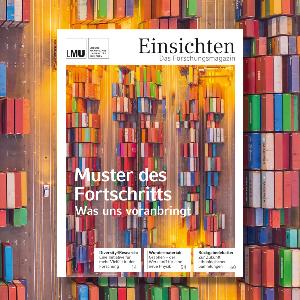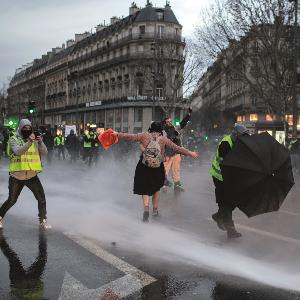A Best-practice model
13 Jun 2022
Karsten Fischer, a political scientist at LMU, discusses the extent to which liberal democracies still stand for social progress at a time when populism is prevalent on all sides.
13 Jun 2022
Karsten Fischer, a political scientist at LMU, discusses the extent to which liberal democracies still stand for social progress at a time when populism is prevalent on all sides.
Ask Karsten Fischer what progress means in the context of democracy and the political scientist begins by quoting rock musician Bono. Bono? Yes, because in a guest article for the Frankfurter Allgemeine Zeitung (FAZ) newspaper three years ago, the U2 front man wrote that “there has never been a better time or a better place to be born than in Europe during the last 50 years”. Coming from someone whose perhaps best-known song is about a massacre during the Northern Irish ‘Troubles’ 50 years ago, that is a remarkable statement: On ‘Bloody Sunday’ on 30 January 1972, 13 people were killed and another 13 injured by the British Army.
Yet the singer has been able to see that liberal democracies such as that in Great Britain and Ireland also have the capability to resolve conflicts. Although many wounds have yet to heal, the Troubles in Northern Ireland are history. Bono’s comments in the FAZ centered around one notion: The concept of liberal democracy, which has shaped most of the countries of Europe as well as those of North America, enables a measure of public participation and civil liberties that is without equal in the history of humankind.

Read the answers in the new issue of our research magazine EINSICHTEN/INSIGHTS at www.lmu.de/einsichten. | © LMU
Fischer’s reference to Bono reveals what may be a surprising take on the moments when liberal democracies are at their strongest: They prove their worth precisely when they survive crises. Escalation in Northern Ireland was not the only thing that happened in 1972. It was a year full of political turbulence in Germany, too. On 27 April 1972, the German Bundestag held a vote of no confidence proposed by the [Christian Democratic and Christian Social] Union against incumbent Chancellor Willy Brandt, a Social Democrat. A verdict of no confidence was warded off only by buying votes. “This was the height of political corruption in Germany,” Fischer notes. “Yet democracy did not suffer the slightest damage.”
At the time, Brandt’s coalition of Social Democrats (SDP) and Free Democrats (FDP) had only a razor-thin majority in parliament. The defection of several MPs from the FDP and SPD to the Union parties appeared to have ended the majority enjoyed by the legitimately elected government. But a vote of no confidence, whose aim was to bring down the Chancellor, failed to elicit the required number of votes. Why? Because two MPs from the Union camp did not back their parties’ motion. It is regarded as fact that at least one of the two had received money from East Germany to not vote against Willy Brandt, whose Ostpolitik (policy toward the east) was seeking rapprochement with the other German state. And it is highly probable that the second MP also took a bribe. In the aftermath of the no-confidence vote, the Federal Republic experienced a marked politicization of society. The elections in fall 1972 drew a record turn-out of 91.1 percent. To put that in context: The turn-out for the general election in 2021 was almost 15 percentage points lower.
The "resilience" of liberal democracies is even stronger than its reputation.Prof. Karsten Fischer
Fischer also sees the “resilience” of liberal democracies – their ability to emerge from crises – relatively unscathed or perhaps even stronger, when he talks about 6 January 2021. He is in no doubt that a lot was at stake when supporters of former President Donald Trump, some of them with paramilitary equipment, stormed the US Capitol building: “A coup was only just averted.” Yet here again, the political scientist sees proof of his theory: “The resilience of liberal democracies is better than its reputation.”
That said, he is also aware of considerable dangers. Since its earliest origins in Ancient Greece, democracy as we know it today has been “fast asleep for 2,000 years”, as Fischer puts it, right up into the modern era. Since the revival of democratic movements in late 17th century England, and in the USA after it gained independence in 1776, there has nevertheless been no linear democratic progress. On the contrary, Fischer sees ample empirical evidence for the hypothesis of “waves” in the global development of democracy, as postulated by American political scientist Samuel P. Huntington. While Fischer describes Huntington’s ideas about a “Clash of Civilizations” as problematic, he sees the Harvard man’s analysis of crises in democracy regularly being followed by the strengthening of democratic structures over the past 150 years as sound.
The LMU researcher is, however, concerned that many people are unaware of what is at risk if democracy falls back into apathy and lethargy. In Fischer’s eyes, political science thus has a number of jobs to do. It must: describe what factors characterize which varieties of democracy; identify where the divide runs between still-democracy and no-longer-democracy; and show what processes lead to the crossing of this divide.
Depending on how free elections, public opinion and the judicial system really are, political science distinguishes between different varieties of democracy (v-dem.net). Liberal democracies, for example, exhibit a high degree of freedom. On the other hand, electoral democracies allow the government to be voted out but places restrictions on media freedoms and those of court decisions, for example. Electoral autocracies enjoy still less freedom. They too hold elections, but these are massively controlled by the powers that be. Lastly, closed autocracies do not permit anyone in society, the media or the judicial system to question the rulers’ claim to absolute power. However, Fischer explains that numerous “hybrid forms” of these four varieties exist.
The LMU political scientist sees Hungary as an example of how a liberal democracy can drift beyond the dividing line. It was 2014 when Hungarian politician Viktor Orbán first cited “illiberal democracy” as the goal he, as prime minister, was pursuing for his country. Initially, Orbán stressed that this simply indicated a desire to impose stricter state regulatory controls on the economy than in many other European countries. However, restricting the diversity of the media landscape and the right to freedom of speech is central to his policy.

Revolt of the loud minorities: Yellow Vests Protest in Paris, 2019. | © © Ali Arkady / VII / Redux / laif
In a list of comparative press freedoms, the organization Reporters Without Borders gives Hungary by far the lowest rank of any European Union member state. In global comparison too, the country has slipped further and further down the field over the years. Orbán‘s media policy was very likely a key factor in ensuring that his parliamentary majority was reaffirmed last April: A decidedly pro-government press prepared the way for his reelection. Election observers from the Organisation for Security and Co-operation in Europe (OSCE) arrived at the same conclusion. While they did attest that the elections were properly conducted in formal terms, the OSCE observers criticized that the government had muddied the distinction between state and party in the run-up to the election. They added that the electoral campaign had been shaped by “media bias and untransparent campaign financing”.
Yet Fischer also sees threats to the democratic process in the USA, Germany and France, warning against a “tyranny of the minority”. For years, he says, political discourse in liberal democracies has rightly focused on the issue of how different social groups can be protected against repressive decisions by political majorities. There have been debates about the political and economic equality of women, about racism, about the inclusion of disabled people and about the discrimination of people from the LGBTQ community.
Today, however, Fischer argues that majority decisions increasingly have to be defended against minorities with a tyrannical mindset – groups who oppose both the rights of individual minorities and democratic majority decisions.
One example is the way US voters’ majority decision to elect Joe Biden as President was attacked by adherents of his predecessor Donald Trump. Similar observations were made in France during the ‘Yellow Vests’ movement, Fischer notes. His analysis? “Here, an attempt was made to delegitimize a president elected with a huge majority.”
In Germany, what became known as the Querdenker or ‘lateral thinker’ movement very persistently called into question the legitimacy of democratic decisions soon after the outbreak of the coronavirus pandemic: “This is a new phenomenon that will occupy political scientists and also adjacent disciplines such as social psychology for a long time to come.”
What makes the latter example especially problematic is that, in Fischer’s words, resistance to the corona measures casts doubt on the “constitutionalist variety” of democracy. Germany, he says, has a very sophisticated model of constitutional jurisdiction. It would, for example, have been possible to have the Federal Constitutional Court examine whether a Bundestag decision on compulsory vaccination might violate basic rights. However, right from the start of the debate about compulsory vaccination, the LMU academic sees a challenge to democracy: “If a small, radical minority makes so much noise that the politicians anticipate and submit to the demands of this minority in advance by refraining from making decisions, that is in itself a symptom of the tyranny of the minority.”
A paradox of autocracies: These regimes deal better with problems that they would not have if they were not autocracies.Karsten Fischer
The question is therefore: Are political systems that permit less participation and discussion ultimately more successful? “Not at all,” Fischer contends. At first glance, he admits, authoritarian states such as Russia and China can deal with problems efficiently. But he then points to what he calls the “paradox of autocracies”: “These regimes deal better with problems that they would not have if they were not autocracies.”
Fischer sees China as a case in point: After a certain point in the corona pandemic, the country implemented lockdowns very radically and was thus initially successful in curbing the spread of the disease. Yet the regime had initially suppressed reports about SARS-CoV-2 harshly – a policy that prevented early efforts to combat the virus. Moreover, many medical experts believe that China’s isolation from the outside world in the development of a vaccine has come back to haunt the regime, especially since spring 2022: Since the Chinese vaccines Sinopharm and Sinovac are obviously not effective enough to contain new corona outbreaks, the government is now once again turning to radical lockdowns.
But shouldn’t liberal democracies develop their own strategies to make themselves more resistant to authoritarian tendencies? Fischer is skeptical of such deliberations. He sees developing a “narrative” about strengthening democracy as another paradox: “Liberalism is highly critical of ideologies, and hence also of narratives. You can’t make democracy resilient by placing an order for a campaign with the Federal Agency for Civic Education (BPB), he argues. Fischer believes that a constructive, vibrant debate about the value of democracy – of government by the people – must come from the people. It is as simple as that. And yet so difficult. A paradox, precisely.
Nikolaus Nützel
Prof. Dr. Karsten Fischer
holds the Chair of Political Theory at LMU’s Geschwister Scholl Institute of Political Science (GSI). He also heads the Voegelin Center for Politics, Culture and Religion at GSI. Born in 1967, Fischer studied political science, philosophy and international law at the Universities of Bonn and Frankfurt/Main. He earned his doctorate and qualified as a professor at the Humboldt University in Berlin. Fischer lectured and conducted research at institutions such as the Berlin-Brandenburg Academy of Sciences and Humanities and Humboldt University before moving to Munich in 2010.
Read more articles of the current issue and other selected stories in the online section of INSIGHTS. Magazine.